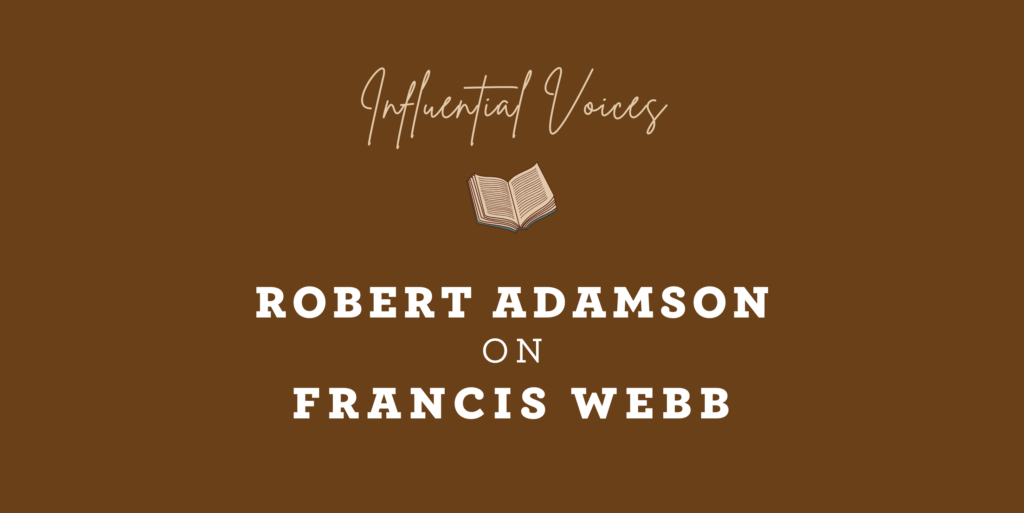
I discovered Francis Webb’s poetry around 1966 in anthologies. Webb’s poems were alive on the page. He was urgent and more dangerous than the general run of poets published in this country. He had published several books, however by this stage, they were out of print. Webb’s Collected Poems would be eventually published in 1969.
In 1967, I discovered in a secondhand bookshop, The Ghost of the Cock. Published in 1964, it was his final volume of poetry before the Collected. At the time, the title alone convinced me I’d found treasure. The Ghost of the Cock is in my opinion his best book. It includes the long sequence, ‘Ward Two’: portraits of his fellow patients in what he called the ‘prison horror’ of Parramatta Psychiatric Hospital. These are poems about terrible suffering but they are also strangely beautiful. I was impressed by the brilliant technical control and moved by the content. One poem is about a patient undergoing a pneumo-encephalograph. It’s a painful process in which a bubble of air is injected into the spine and travels up over the top of the brain as x-rays are taken. The poem describes the process in details that transform a medical procedure into a metaphor for spiritual alchemy:
Of pain’s amalgam with gold let some man sing / While, pale and fluent and rare / As the Holy Spirit, travels the bubble of air.
In those days, it hadn’t occurred to me that Francis Webb was someone you could actually meet. It hadn’t even occurred to me that he might be living in Sydney. However, I met John Buttsworth at a dinner party and he introduced himself as a psychiatrist, the director of Callan Park Mental Hospital. He and I began chatting, and he started telling me about a patient of his, Frank Webb, who was a poet. The name ‘Frank’ threw me for a second or two. Not Francis Webb?
I was incredulous. ‘Yes, that’s right,’ said John. ‘Have you come across his poetry?’ Come across it? I’d been reading Webb’s The Ghost of the Cock for more than a year and loved it — I thought it was as good as Hart Crane, who was my favorite poet at the time. ‘Shit!’ I replied, catching the attention of everyone in the room. ‘You have Francis Webb locked up in Callan Park? He’s Australia’s greatest poet!’
John set up a meeting at 10am the next Monday, if I remember rightly. He said he’d get Frank and bring him to the office; we’d be more comfortable here, he explained. I wondered, while waiting, what Francis Webb would look like: there was no author’s photo on The Ghost of the Cock and I’d never seen one in any of the literary magazines. But I wasn’t left wondering for long. John came back a few moments later and ushered Francis into the room. He was 44, but looked much older. His face was deeply lined and his short, graying, crewcut hair gave him quite a tough look: his manner was strong but guarded. He reminded me of George C Scott, the actor who played ‘Patton’ in the movie, a brilliant but wired World War II General.
John introduced us, asked if we’d like tea or coffee, and we both declined. ‘Okay, then. I’ll leave you two in peace.’ Francis had an Australian accent, but not a broad one, and spoke only in snatches for the first 10 minutes or so. After John left, I pointed to some lounge chairs and suggested we sit down and get comfortable.
We launched into a long conversation about poetry. Sometimes he seemed to catch himself from expressing an opinion, but he was articulate and full of praise when discussing poets he loved. I noticed, however, that he often made disparaging remarks about himself, especially when I started talking about The Ghost of the Cock.
Frank seemed to think I wanted a copy. He told me he’d given the last one he owned to a male nurse who liked poetry. I was saddened to hear this. I assured him I already had a copy but would gladly give it to him. But this only seemed to agitate him. He said he didn’t want to talk about his own work and was silent for a moment. I decided to change tack.
I asked him what he thought of the American poets and we embarked on a long and involved conversation about Hart Crane. Francis smiled for the first time.
Sensing I had to tread carefully, I asked him who his favourite Australian poet was. He considered the thought carefully, then replied with deliberation: ‘Douglas Stewart’. This surprised me: in my mind Douglas Stewart was a publisher and poet who’d written some delicate lyrics about rock orchids and a few boring radio plays about explorers. ‘Douglas Stewart,’ I repeated, dumbfounded.
‘Why Douglas Stewart?’
‘Because,’ said Francis, leaning towards me, his tone of voice confidential, ‘he once lent me five pounds.’
Here’s a quote from Francis Webb’s poem, ‘Black Cockatoos’, a splendid way to end this small tribute:
Black cockatoos are somewhere under the sun / Down with the mattocks, let the wild couch-grass run / Take the gully-road, slide on the sticks and stones/ And wait for the artists of Heaven, the crested ones.
About the Writer
Robert Adamson won the Christopher Brennan Prize for lifetime achievement, the Patrick White Award (2011), and the Victorian Premier’s Award for poetry (2009) for The Golden Bird. His most recent book is Net Needle (2015).
More from Writing NSW
Check out our full range of in-person writing courses in Sydney, our online writing courses and our feedback programs to see how we can help you on your writing journey. Find out about our prizes and opportunities, as well as writing groups across NSW, and sign up to our weekly newsletter for writing events, opportunities and giveaways.
